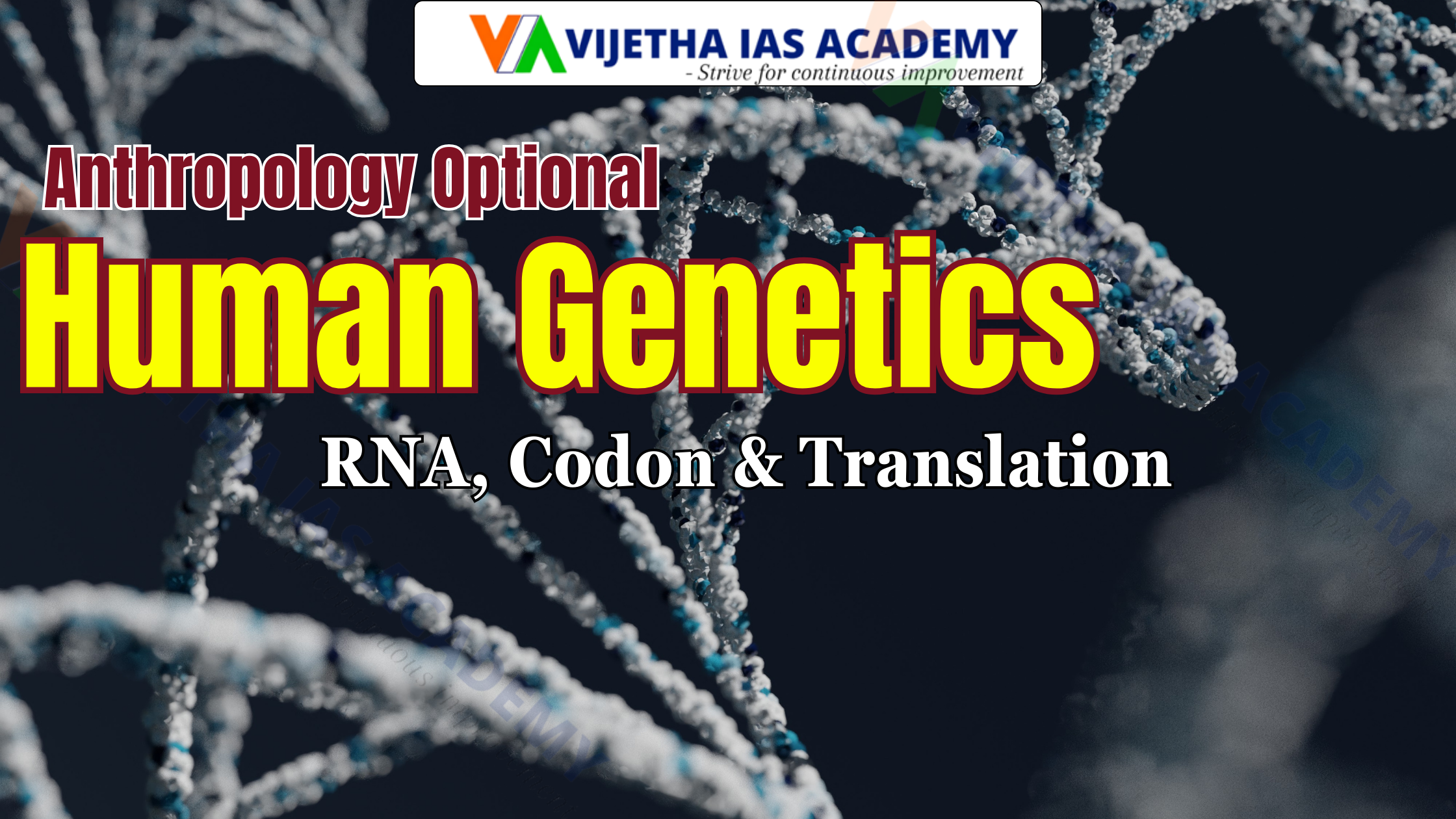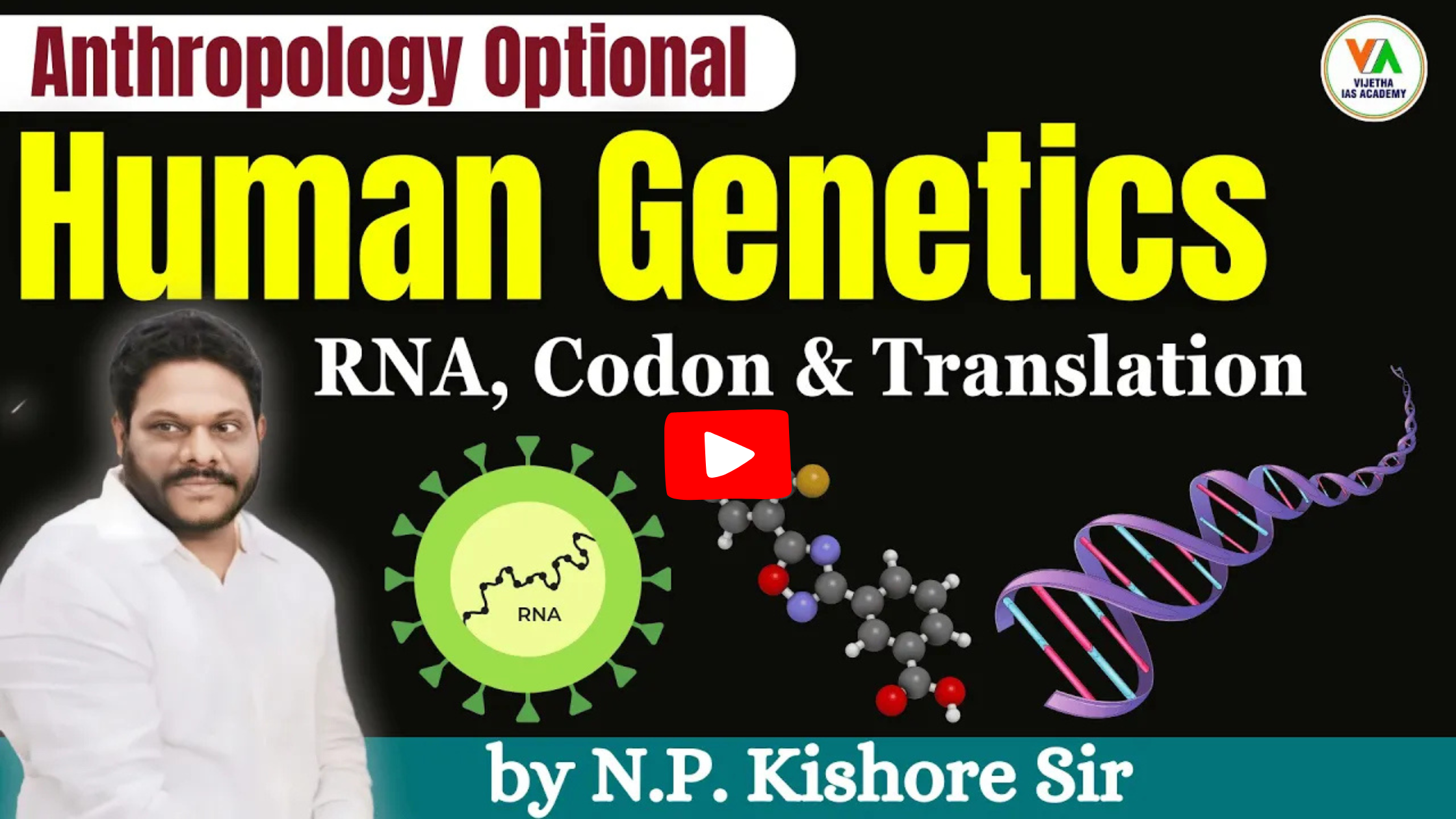
Human Genetics | RNA, Codon & Translation in Anthropology Optional by N.P. Kishore Sir
When preparing for the UPSC Anthropology Optional, students often encounter complex topics like Human Genetics, including the detailed processes of RNA, Codon, and Translation. Under the expert guidance of N.P. Kishore Sir at Vijetha IAS Academy, these challenging subjects are broken down into simple, digestible components, making Anthropology Optional one of the best and easiest choices for UPSC aspirants.
For more information about How to Prepare Notes in Anthropology optional topic Click on My youtube Link: https://youtu.be/EkKIqOGL1Yk?si=fGCeJhi6oD77D-jE
Understanding Human Genetics in Anthropology Optional
Human genetics is a key part of Biological Anthropology, covering the study of genes, genetic variation, and heredity in humans. The syllabus delves into genetic markers, DNA, RNA, and the processes of protein synthesis like transcription and translation, making it crucial for Anthropology Optional aspirants to have a clear understanding of these topics.
Vijetha IAS Academy, led by N.P. Kishore Sir, provides students with clear, concise notes and lectures that explain these complex processes. Human genetics is not only essential for the syllabus but also relevant in understanding human evolution, variation, and adaptation, all of which form the foundation of Anthropology Optional.
The Role of RNA in Anthropology Optional
RNA (ribonucleic acid) plays a pivotal role in translating genetic information from DNA into proteins. This process is fundamental to the Anthropology Optional syllabus as it forms the basis of genetic studies in humans.
- Types of RNA: RNA exists in different forms, including mRNA (messenger RNA), tRNA (transfer RNA), and rRNA (ribosomal RNA). Each type has a specific function in the translation process.
- mRNA: Carries genetic information from DNA to the ribosomes, where proteins are synthesized.
- tRNA: Helps decode the mRNA sequence into a protein by matching codons with the appropriate amino acids.
- rRNA: Forms the core of the ribosome’s structure and catalyzes protein synthesis.
In N.P. Kishore Sir’s Anthropology lectures at Vijetha IAS Academy, these concepts are explained in detail, allowing students to grasp their significance within the broader context of human genetics.
Decoding Codons in Anthropology
Codons are sequences of three nucleotides found on mRNA that correspond to specific amino acids or stop signals during protein synthesis. Codons are central to the process of translation and are a core part of the Anthropology Optional syllabus.
- Start Codon: The codon AUG acts as the start signal for protein synthesis.
- Stop Codons: Codons like UAA, UAG, and UGA signal the end of translation.
The interaction between codons and anticodons, mediated by tRNA, is a crucial step in ensuring that proteins are assembled correctly, which is essential in understanding genetic variation and evolution, both key topics in Anthropology Optional.
At Vijetha IAS Academy, N.P. Kishore Sir uses detailed diagrams, real-world examples, and case studies to help students decode the complex processes of codon and translation, which are frequently tested in the UPSC exam.
Translation Process in Anthropology
The process of translation is the next crucial step after transcription in protein synthesis. In translation, the mRNA sequence is read by the ribosome, and tRNA molecules bring amino acids to build the corresponding protein. This process is fundamental to understanding how genetic information translates into physical traits and behavior, a core element of Biological Anthropology in the Anthropology Optional syllabus.
- Initiation: The mRNA binds to the ribosome, and the start codon (AUG) initiates the process.
- Elongation: tRNA brings specific amino acids, which are linked together to form a polypeptide chain.
- Termination: Once a stop codon is reached, the process ends, and the newly synthesized protein is released.
Students at Vijetha IAS Academy are guided through this complex process by N.P. Kishore Sir, who ensures that even the most technical aspects of RNA, codon, and translation are made easy to understand. The academy’s student-centric approach, combined with years of mentoring experience, makes Anthropology Optional not only easier but also enjoyable for aspirants.
Why Choose Anthropology Optional at Vijetha IAS Academy?
Anthropology is widely regarded as one of the most scoring and straightforward optional subjects for UPSC, and Vijetha IAS Academy under N.P. Kishore Sir provides the best coaching in this domain. The academy’s approach is highly student-centric, offering personalized mentorship, daily answer writing practice, and comprehensive coverage of complex topics like Human Genetics, RNA, codon, and translation.
At Vijetha IAS Academy, students benefit from:
- Expert Guidance: N.P. Kishore Sir has decades of experience in mentoring students, simplifying complex concepts, and providing targeted feedback to improve performance.
- Comprehensive Study Material: The academy provides concise and relevant notes that cover every aspect of the Anthropology Optional syllabus.
- Daily Answer Writing Practice: The academy emphasizes daily practice, ensuring that students are well-prepared for the exam.
If you're an aspirant aiming to excel in Anthropology Optional, Vijetha IAS Academy is your best bet. Their approach ensures that you not only master difficult topics like human genetics but also become proficient in applying that knowledge in your answers.
When writing about Human Genetics, RNA, Codon, and Translation for Anthropology Optional, we ensure that the blog is fully optimized with trending keywords and medium to long-tail keywords for effective SEO ranking. By integrating important keywords like Anthropology Optional, Vijetha IAS Academy, N.P. Kishore Sir, RNA, codon, and translation, this blog is designed to rank highly on search engines, making it easily discoverable by students searching for UPSC Anthropology resources.
Conclusion
Human Genetics, with its focus on RNA, codon, and translation, is a core topic in the Anthropology Optional syllabus. Under the guidance of N.P. Kishore Sir at Vijetha IAS Academy, you can conquer this topic with ease. The academy’s student-focused approach, expert guidance, and practical learning strategies ensure that you will not only understand these complex concepts but also master them for the UPSC exam.


